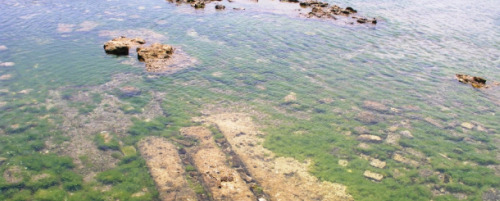Three major studies by Israeli researchers on climate change in the Middle East shed new light on various aspects of global warming and how we should contend with them.

Researchers around the world are putting their minds together, focusing on both global and local patterns to find symptoms of climate change. From coring into ice samples at the North Pole, to measuring coral reef damage in the Red Sea, scientists want to know how man-made global warming will affect nature, and our place in it.
With the basic tools of science, Israeli researchers are looking to the past and present to understand climate in the Middle East — evidence which could be useful on the global scale.
Three major studies in this direction were published recently by Israeli researchers, shedding new light on how carbon sinks in forests work, what we should interpret from short-term patterns on rising sea levels, and how humans may adapt their agricultural practices to changing climates.
These studies add to the bigger picture, helping scientists question assumptions about climate change and piece together our long-term understanding of the impact of global warming.
Forests’ role as carbon sinks
While they don’t create the most valuable carbon credits, companies, NGOs and individuals know that planting forests is one way to suck carbon dioxide (CO2) emissions from the atmosphere. But, according to a new Israeli study, it may be time to rethink the forests’ role in cleaning up this greenhouse gas, because it could take decades before forests are actually effective in reducing CO2 emissions.
In the January 22 issue of Science, Professor Dan Yakir from the Weizmann Institute’s Environmental Sciences and Energy Research unit has found that what once seemed like a straightforward formula — that planting forests removes greenhouse gases converting the CO2 to plant matter, may not be so simple and clear after all.
During a nine-year study in the Yatir Forest, Yakir found that forests can and do directly absorb and retain heat, but that there are some conditions where the heat-retaining effects of the forests are so strong, that they cancel out the benefits of lowering CO2 gases in the atmosphere.
“Although the numbers vary with location and conditions we now know it will take decades of forest growth before the ‘cooling’ CO2 sequestration can overtake these opposing ‘warming’ processes,” says Yakir.
“Overall, forests remain hugely important climate stabilizers, not to mention the other ecological services they provide, but there are tradeoffs, such as those between carbon sequestration and surface radiation budgets, and we need to take these into consideration when predicting the future,” he adds.
A perspective on rising seas
Fears of rising sea levels are rife today. Many scientists believe that global warming may cause sea levels to increase so drastically that they will wipe out entire cities and island countries like the Maldives and Tuvalu.
Rising sea levels pose a threat to mankind, not only because they flood the ground some of us live on, but also because rising seas can affect coastal aquifers, flood effluent plants and cause coastal destruction.
In research led by Dr. Dorit Sivan, head of the Department of Martime Civilizations at the University of Haifa, she examined sea levels in Israel over the past 2,500 years based on coastal archaeological findings, to see how they have changed over that period.
Looking at evidence that was accurately dated, she and her research student could measure the sea level today as compared to what it was when the site was actively populated.
Sivan discovered that over the last couple of thousand years, sea levels on Israel’s coasts have waxed and waned. During the Crusader period, for instance – just 800 years ago – the sea level was 20-35 inches lower than today’s level.
Further investigation revealed that during the Hellenistic period, the sea level was even lower, at 5.25 feet below what it is today. However, during Roman times about 2,000 years ago, the sea level was about the same as it is today, dropping during the Muslim era.
In the wake of this study, Sivan asserts that short-term periods of rising water in the sea may not reveal long-term trends. “It is early yet to conclude from the short-term increases in sea level that this is a set course that will not take a change in direction,” she explains.
An observation of the sea levels over hundreds and thousands of years shows that what seems to be a phenomenon today may be “nothing new under the sun”, Sivan concludes.
Sivan’s research may provide clues for marine scientists attempting to determine the impact of global climate patterns on our seas, especially on island nations now threatened by rising sea levels.
Looking at ancient agriculture
It may have killed an important Viking community a couple of hundred years ago, but climate change in natural history wasn’t always a bad thing, reasons Dr. Sahal Abbo, an agronomist and geneticist from the Hebrew University of Jerusalem.
In some cases, he says, naturally caused climate change patterns in the world actually opened up new food resources for animals and humans. And this may very well happen if arctic summers lengthen in the future.
Until now, scientists believed that the agricultural revolution that occurred in the Near East some 10,000 years ago, was due to a radical change in climate. In his research, however, Abbo examined farming practices during this period and found that sustainable farming and the introduction of new crops relied on a relatively stable climate, not dramatic conditions attributable to climate change.
Looking at evolutionary, ecological, genetic and agronomic data, he and his team discovered the kinds of crops found in the Near East were used because they suited the Mediterranean rainfall patterns found in the region — where wet years created enough food supplies to sustain farming communities during the impossible drought years.
“We argue against climate change being at the origin of Near Eastern agriculture and believe that a slow but real climatic change is unlikely to induce revolutionary cultural changes,” says Abbo.
In their new study reported in Springer’s journal Vegetation History and Archaeobotany, the Israeli researchers demonstrate why climate change is not the likely cause of plant domestication in the Near East, as previously believed by archeo-botanists.
Although he is working with the past, Abbo’s knowledge allows him to infer what might come to pass in the future in other parts of the world after climate change sets in. “I have no idea what would be the rate of the change, whether the weather patterns will change quickly or slowly. If… trends are right, I presume some opportunities will open beyond the tree line in Canada and maybe in Scandinavia and Russia,” he tells ISRAEL21c.
“Our story was about the origin of agriculture and we tried to refute that climate change in the past drove people to do agriculture. We didn’t think it made sense, on the face of it. Knowing a little bit about cropping systems in the arctic and Canadian prairies, if say the summer will be longer close to the arctic, conditions for agriculture there could improve.
“We know there is evidence that the Viking’s settlement in Greenland collapsed because of a mini ice age a couple of hundred years ago. When the season shortened by a couple of weeks, the effect was strong enough for the barley not to ripen. The whole system collapsed,” he explains.
“One thing is for sure is that mankind is overexploiting this planet. We are doing it an injustice and are destroying everything,” he adds.












